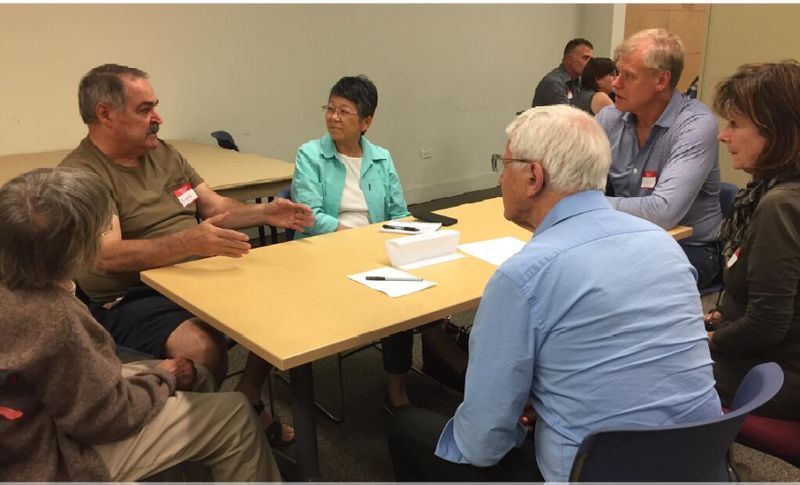19 Phrases That Make You Sound Emotionally Intelligent In Any Conversation
Navigating conversations can be a delicate dance of emotions and understanding. The ability to articulate thoughts in a way that reflects empathy and insight is a hallmark of emotional intelligence.
This blog post explores 19 phrases that can enhance your communication, making interactions more meaningful and respectful. By incorporating these expressions into your dialogue, you foster an environment of connection and trust.
1. I hadn’t considered that—thanks for sharing it.

Acknowledging another’s perspective with grace shows openness and willingness to learn. When you express gratitude for someone’s thoughts, it strengthens the rapport and encourages more open dialogue. This phrase indicates an acceptance that you don’t have all the answers and that others’ viewpoints are valuable.
It’s a simple yet profound way to nurture mutual respect. By doing so, you make the other party feel heard and valued, fostering a positive atmosphere. Such expressions reassure the speaker of their contribution’s significance. Hence, it paves the way for constructive discussions and collaboration. This attitude reflects a mature approach to communication, promoting understanding and cooperation.
2. Can you help me understand what you mean by that?

Inviting clarification reflects a genuine desire to understand, rather than assume. This approach shows respect for the speaker’s viewpoint and demonstrates that you value their input. It encourages them to elaborate, ensuring that communication is clear and effective. This phrase also conveys humility and the acknowledgement that interpretations can vary.
By seeking further explanation, you build bridges rather than walls. It’s a practice that develops clearer understanding and minimizes misinterpretations. Moreover, it creates an inclusive environment where all voices feel important. The act of asking questions strengthens relationships by showing interest and engagement.
3. I can see how that would be frustrating.

This phrase signifies empathy and validation of emotions. By acknowledging someone’s frustration, you demonstrate an understanding of their experience. It helps the other person feel seen and heard, reducing feelings of isolation or misunderstanding. Empathy is a cornerstone of emotional intelligence, fostering compassion and connection.
This acknowledgment can de-escalate potential tension and create a supportive dialogue. When emotions are recognized, it often leads to more open and honest conversations. It is a step towards resolving issues collaboratively, showing that you care about the person’s feelings and are there to support them.
4. That’s fair. Let me think about it.

Acknowledging fairness with openness to reconsider promotes mutual respect. This phrase shows that you value the other person’s input and are willing to reflect on it. It conveys respect for their opinion, even if it differs from your own, and an openness to change your perspective. By taking time to think, you avoid impulsive reactions and instead foster thoughtful responses.
This careful consideration helps in making well-informed decisions. It demonstrates self-awareness and a commitment to understanding before acting. Such an attitude encourages a balanced and fair interaction, strengthening trust and honesty in relationships.
5. Would it be okay if I gave another perspective?

Offering a different perspective with permission fosters inclusivity and respect. This phrase shows that you value the collaborative nature of conversation and are considerate of the other person’s comfort. It opens a space for dialogue that includes diverse viewpoints without imposing your ideas. By seeking consent, you demonstrate awareness of boundaries and respect for the other’s autonomy.
This approach encourages more open, honest discussions, where differing opinions are seen as enriching rather than conflicting. It supports a culture of mutual respect and learning, building a foundation for creative and cooperative problem-solving.
6. You’re allowed to feel that way.

Validating emotions signifies acceptance and understanding. This phrase acknowledges the legitimacy of another person’s feelings, creating a safe space for expression. It reassures them that their emotions are respected and not judged. Such acknowledgment helps in alleviating emotional distress and promotes emotional healing.
By affirming their feelings, you foster a trusting relationship where open communication is welcomed. This approach reduces defensiveness and promotes honest dialogues, enhancing mutual respect. It demonstrates emotional maturity by recognizing that emotions are personal and valid. This validation fosters a compassionate and understanding environment.
7. I was wrong about that, and I appreciate your patience.

Admitting mistakes with grace reflects humility and responsibility. This phrase shows that you value truth and integrity over ego. It recognizes the other person’s patience while you navigated your error, fostering a forgiving atmosphere. This admission encourages a culture of learning and growth, where mistakes are seen as opportunities for improvement.
It signals respect for the other person’s perspective and a commitment to personal growth. By owning up to mistakes, you build trust and strengthen relationships. It is a testament to personal accountability, enhancing your credibility and fostering an environment of mutual respect.
8. Let’s take a moment before we respond.

Pausing before responding promotes thoughtful communication and emotional control. This phrase suggests a shared decision to approach the conversation mindfully, reducing impulsive reactions. It encourages reflection and allows emotions to settle, leading to more constructive dialogue. This practice shows respect for the conversation and the individuals involved, valuing clarity over haste.
By taking a moment, both parties can gather their thoughts, leading to a more balanced exchange. It supports a calm and considered approach to communication, enhancing understanding and reducing potential conflict. This thoughtful pause demonstrates emotional intelligence and respect.
9. I respect your experience, even if it’s different from mine.

Acknowledging differing experiences with respect builds bridges across diverse perspectives. This phrase demonstrates an appreciation for diversity in thought and backgrounds. It shows that while you might not have lived the same experiences, you value what they bring to the conversation. Such recognition fosters an environment of inclusivity and understanding, promoting a culture of acceptance and learning.
It encourages open dialogue, where differences are celebrated rather than divisive. By valuing diverse experiences, you enhance the richness of the conversation and support a stronger, more connected relationship. This attitude showcases emotional maturity and respect.
10. That hit me harder than I expected—can we pause?

Acknowledging emotional impact with honesty promotes transparency and self-awareness. This phrase signals that you’ve been significantly affected by the conversation and need time to process it. It shows vulnerability, a key component of emotional intelligence, and encourages an open, empathetic interaction. By requesting a pause, you demonstrate respect for both your own emotional state and the dynamics of the conversation.
This approach allows for thoughtful reflection and helps in managing emotions effectively. It fosters a safe environment where emotional honesty is appreciated and respected, supporting deeper connections and mutual understanding.
11. Thank you for being honest with me.

Expressing gratitude for honesty reinforces trust and openness. This phrase shows that you value transparency and the courage it takes to speak candidly. Gratitude for honesty fosters a safe space where open communication is encouraged and respected. It reassures the speaker that their truthfulness is appreciated, not judged, paving the way for more honest exchanges.
By valuing candor, you build stronger, more authentic relationships. This appreciation of honesty enhances mutual respect and trust, creating a foundation for more meaningful interactions. Such acknowledgment of truthfulness reflects emotional intelligence and strengthens connections.
12. I’m open to hearing how I came across.

Inviting feedback with openness reflects self-awareness and a commitment to growth. This phrase shows that you value other people’s perceptions and are willing to learn from them. It encourages constructive feedback, fostering an environment of personal and mutual development. By being open to how you are perceived, you demonstrate humility and a willingness to improve.
This attitude supports a culture of transparency and trust, where honest feedback is seen as a gift rather than criticism. Such openness enhances communication, builds stronger relationships, and reflects a high level of emotional intelligence.
13. What can I do better next time?

Seeking improvement actively signifies commitment to growth and excellence. This phrase shows that you are eager to learn from experiences and are dedicated to self-improvement. It reflects a proactive attitude towards personal development, encouraging a culture of continuous learning. By asking for guidance, you show humility and a readiness to enhance your skills and interactions.
This approach fosters an environment where feedback is valued and used constructively. It demonstrates a forward-thinking mindset, where past experiences are used as stepping stones for future success. Such an attitude promotes a positive, growth-oriented atmosphere.
14. Let me sit with that for a bit.

Taking time to process information reflects deliberation and emotional readiness. This phrase shows that you are willing to give the subject the consideration it deserves before reacting. It conveys a sense of calm and patience, avoiding rushed judgments or responses.
By allowing yourself time to reflect, you approach conversations with greater clarity and insight. This helps in making informed decisions and contributes to more meaningful exchanges. Such an attitude promotes thoughtful communication, where ideas are respected and valued. It supports a culture of patience and understanding, enhancing the quality of interactions.
15. I don’t need to be right—I want to understand.

Prioritizing understanding over being right fosters empathy and connection. This phrase shows that you value the relationship and the other person’s perspective more than winning an argument. It encourages open-mindedness and flexibility, promoting a more collaborative dialogue. By focusing on understanding, you create a safe space where ideas can be shared freely without fear of judgment.
This attitude encourages exploration and learning, enriching the conversation. It reduces defensiveness and supports a more harmonious interaction. Such a mindset reflects emotional intelligence and a willingness to grow, strengthening the bond between individuals.
16. It sounds like this really matters to you.

Recognizing the importance of someone’s feelings or ideas fosters respect and appreciation. This phrase shows that you are attuned to their emotions and value their contributions. It acknowledges the weight of their words or feelings, creating a more supportive and understanding environment. By validating their concerns, you reinforce that their input is valued and significant.
This approach encourages more open sharing and a deeper connection. It strengthens relationships by showing that you care about what matters to them. Such recognition of importance supports a culture of empathy and respect, enhancing the quality of interactions.
17. I’m learning how to show up better.

Committing to personal growth reflects dedication and humility. This phrase shows that you are actively working on improving yourself and your interactions. It conveys a sense of responsibility and a desire to be more present and effective in your relationships. By expressing this commitment, you signal openness to feedback and learning.
This attitude encourages a growth mindset, where challenges are seen as opportunities for development. It fosters an environment where improvement is valued and pursued. Such dedication to self-improvement enhances trust and respect, strengthening personal and professional relationships.
18. Let’s focus on what matters, not just who’s right.

Emphasizing priorities over winning fosters collaboration and understanding. This phrase shows that you value the substance of the conversation more than personal victory. It encourages a focus on shared goals and objectives, promoting a more constructive dialogue. By prioritizing what truly matters, you support a more harmonious interaction where different perspectives are appreciated.
This approach reduces unnecessary conflicts and encourages teamwork. It demonstrates emotional intelligence by valuing the relationship and collective success over individual pride. Such a mindset supports a collaborative environment, enhancing the quality of the interaction.
19. It’s okay if we don’t agree on everything.

Accepting differences with grace promotes harmony and respect. This phrase shows that you value diversity in thought and recognize that disagreements are natural. It encourages a culture of acceptance, where differing opinions are respected and understood. By acknowledging that it’s okay not to agree, you reduce tension and promote a more peaceful interaction.
This attitude supports an open dialogue, where ideas are explored without fear of judgment. It enhances mutual respect and understanding, fostering a supportive and inclusive environment. Such acceptance of differences reflects emotional intelligence and maturity, strengthening relationships.







